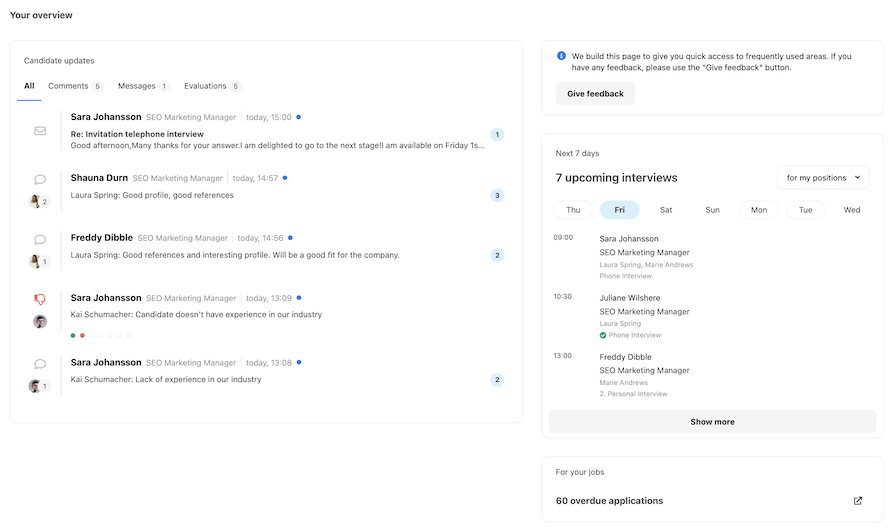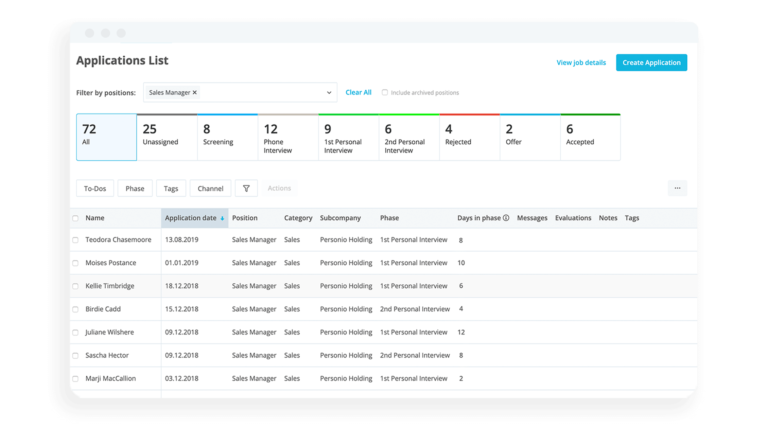
Streamline your hiring process
Explore effective strategies to enhance your recruitment process and attract top talent.
Read our guideRecruitment Marketing: Everything You Need To Know

The world of recruitment has changed, and recruitment marketing can help your organisation keep up. But, why is it so critical for employers to embrace this new recruitment strategy, and, more importantly, how can they make it a reality?
Key Facts
Recruitment marketing is the process of using marketing tactics to attract, engage and recruit top talent for your company.
Recruitment marketing tactics include social media recruiting, paid advertising, inbound recruiting, outreach and using referral programmes.
Capitalising on recruitment marketing can help reduce recruitment costs, speed up the hiring process, increase employee retention and craft a positive candidate experience.
What Is Recruitment Marketing?
Recruitment marketing is a strategy of using targeted measures to entice, engage and nurture talent to apply and work for a company. It takes a traditional marketing ‘funnel’ and applies it to the talent acquisition process through the following stages:
Awareness
Interest
Decision
Action
Let’s dive into each stage with a bit more detail…
1. Awareness
According to LinkedIn hiring statistics, 70% of the global workforce are passive, meaning they’re not actively searching for a new job. That’s a lot of potentially great candidates you could be missing out on. How do you get their attention? First, you need to raise your own brand awareness and market your company as a great place to work – before they’re even looking for a new opportunity.
2. Interest
Now that you’ve got their attention, you need to pique their interest in your company. What you’ll need is an effective content marketing strategy to hook them in and tell your brand story, giving them enough information to make them remember you. Schedule regular updates to ensure you maintain their interest and start to turn passive candidates into active ones.
3. Decision
Now you need to give candidates a reason to apply. What makes your company special? Share the benefits and perks you offer, your corporate culture and the open roles you currently have. According to a LinkedIn study, 49% of candidates want to know what compensation they’ll receive, 33% want professional development and 29% would like a better work-life balance. Do you offer these?
4. Action
The final stage in the process is getting candidates to apply. Remove any barriers that might prevent them from doing this – do you have a lengthy application process? Cut out any unnecessary steps and make it as simple as possible to ensure you don’t put candidates off. Even if you invite a great candidate for an interview and they turn it down, this is a good opportunity to expand your talent pool and keep them on file for future vacancies.
Why Is Recruitment Marketing Important for Employers?
Recruitment marketing is important because the hiring process has fundamentally changed. To gain the best talent for your company, you need to take a proactive approach to finding them and showing them why they should work for you.
At the same time, candidates have a lot more resources at their fingertips and can find out a wealth of information about your company before they even consider applying. You need to make sure that what they discover is appealing. Effective recruitment marketing creates a solid pool of qualified talent waiting for a suitable role.
How To Develop a Recruitment Marketing Strategy
So, how do you develop a robust recruitment marketing strategy? There’s a few key tactics to keep in mind…
Employer Branding
The first step in defining a recruitment marketing strategy is to align it with your employer branding. This is the core of your business and what you stand for. It should embody your culture and company core values, and how you wish to be perceived by potential candidates. You want to be a desirable employer who communicates with transparency.
Social Media Recruiting
Social media is often a candidate’s first port of call when investigating an organisation. Use your platforms to your advantage by showing what a fantastic workplace your company is. Attract fresh talent with consistent content marketing and maintain their interest by engaging with them – don’t simply treat your social media as a job board.
Learn more about social media recruiting and how to use it here.
Paid Advertising
Organic channels simply aren’t enough – you need to leverage paid ads. Craft your perfect target audience from personas and put a little money behind your efforts to get your vacancies in front of the right eyes. Choose your channels wisely for the best return on investment.
Inbound Recruiting
Attract talent to you with regular, engaging and informative content that reflects your company culture and values. Showcase current employees and their favourite parts of the job, highlight exciting projects you’ve recently worked on, share social events and team-building days, maintain a consistent company blog; whatever shows your company in the best light.
Outreach
Email is still alive and is often one of the best ways of getting in touch with potential talent. But rather than sending cold emails, use your content marketing efforts to attract subscribers to a company newsletter. This will allow you to build a list of interested candidates and let them know about any vacancies at the same time, all with one click.
Use Referrals
Your best ambassadors come from within. Encourage employees to recommend candidates with a referral programme. It’s likely that they’ll know people with similar values and work ethics, which is likely to speed up the recruitment process. Referrals are also more likely to stay with the company longer if they already know someone there.
Find out more about employee referral programmes.
Careers Page
While it may seem obvious, the ‘Careers’ page on your website should be a focal point for your recruitment efforts. Interested candidates will naturally look there for any recruitment information, so make sure it’s up-to-date, enticing and accurately reflects your company culture. If you’ve got a ‘Meet the Team’ page, this should also be maintained.
Monitor Analytics
Keeping track of your recruitment metrics can help determine where success lies. Where are most of your applications coming from? How many are relevant? How much are you spending on adverts? What is your ROI? Taking the time to assess this data will help you with your strategy.
Discover how an Applicant Tracking System can help you.
Build A (Talent) Winning Employer Brand

Winning job adverts are only bolstered by an impressive employer brand. How is your organization currently attracting, winning, and retaining top talent? Download our guide to employer branding to make sure you’re matching all of the best practices out there.
Download Our Full eBookTop Recruitment Marketing Tips
Tip #1: Make Your Company Special
To attract the best talent to your business, you need to build your reputation as the best place to work. Focus on differentiating yourself from the crowd and nurture your company culture to not only keep current employees happy, but entice new ones to join the party. Showcase this on your owned channels to highlight why your company is special.
Tip #2: Keep Existing Employees Happy
Speaking of current employees, you can’t foster a great work environment without them, so listen to them and make sure they’re content. Happy employees will want to shout about their workplace and that authenticity speaks volumes to potential candidates. Keep an eye on sites like Glassdoor to make sure your reviews are positive and make an effort to address anything critical.
Tip #3: Build Candidate Personas
Recruitment marketing works best when you know who your ideal candidate is. What are their interests? Where are you likely to find them online? What do they want from their career? Build audience personas so you can target your marketing to the right people. This will also help you narrow down the criteria for successful applicants.
Tip #4: Use Video Content
The prevalence of video content, particularly on social media, continues to rise. So, if you’re not using video in your recruitment marketing, you’re missing a trick. Not only is video more engaging, it’s been proven that people retain more information from videos than from texts they read. Why not interview current employees or do a tour of the office? You could also do a visual reel of recent projects to show what the work is like.
The Top Benefits of Recruitment Marketing
Adopting a recruitment marketing approach to finding new talent can have a variety of benefits, including:
Empowering your employer brand – as the most fundamental stage of recruitment marketing, developing strong employer branding will help your company stand out from the crowd and attract the right kind of talent who shares the same values.
Reducing recruitment costs – taking a more targeted approach to recruitment and attracting candidates to you, as opposed to posting countless job ads, will save hiring costs in the long run.
Improving hiring speed – if your recruitment marketing is done right, you’ll have a strong talent pool you can dip into when vacancies arise and reduce the time it takes to hire. You’ll also attract candidates who have been following you across various channels.
Increasing retention – taking the time to build a good talent pool and investing in recruitment marketing will lead to better hires that are more likely to stay for longer. This is especially true if they have been monitoring your brand, as what attracted them to your company should keep them there.
Creating a positive candidate experience – recruitment marketing allows you to make a great first impression and start a better candidate experience from day one. Each touchpoint should be tailored to the stage they’re at in the funnel.
Frequently Asked Questions
What Does Recruitment Marketing Mean?
Recruitment marketing is the name given to the marketing strategies used to attract, engage and recruit the best talent to your company. It’s a key step in the talent acquisition process and allows you to build a strong talent pool to pull from when vacancies arise.
Why Is Recruitment Marketing So Important?
Recruitment marketing is so important because the hiring process has changed in recent years. To attract the best talent, employers need to be more proactive and make their workplace stand out amongst the sea of competitors. Candidates can also do much more research into your company than previously, so you need to make sure they like what they see.
What Does a Recruitment Marketing Specialist Do?
A Recruitment Marketing Specialist is a fundamental part of Human Resources and develops the recruitment marketing strategies for the business. They are also responsible for shaping the employer branding and nurturing the company culture to entice top talent to apply.
How Do You Attract Candidates for Recruitment?
Recruitment marketing is a great way to attract candidates to your business. Taking a more targeted approach to recruitment and building your reputation as a desirable employer helps to reduce the hiring process time as well as increase retention amongst new recruits.
If you’re struggling to bring top talent into your business, consider using recruitment marketing to help. Formulate a strong content marketing strategy to showcase why your company is a great place to work, and use organic and paid channels for maximum results. By attracting talent, you’ll save on recruitment costs, improve hiring speed and increase retention, as well as create a better candidate experience throughout the journey.
Disclaimer
We would like to inform you that the contents of our website (including any legal contributions) are for non-binding informational purposes only and does not in any way constitute legal advice. The content of this information cannot and is not intended to replace individual and binding legal advice from e.g. a lawyer that addresses your specific situation. In this respect, all information provided is without guarantee of correctness, completeness and up-to-dateness.

